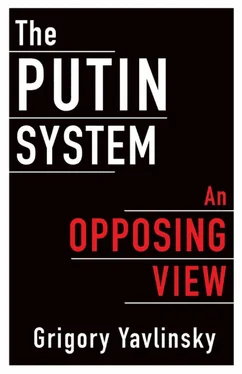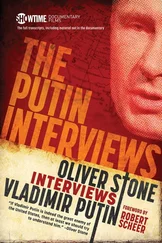Another reason to analyze Russia in terms of peripheral authoritarianism is that the trajectory of the political systems of even the most developed countries of the world—from their emergence to their present-day, competition-based polities—passed through some form of autocratic rule. And the autocratic periods in their histories are not that far removed from our times. Thus, both Japan and South Korea made their leaps toward their present position as part of the “Western world” not so long ago by history’s standards. In South Korea, this was done under conditions of the ruling group’s quite severe crackdown on political opposition; in Japan, the authorities steadily marginalized the opposition by nonviolent means.
Let us also not forget that, just forty or fifty years ago, some of the countries in Southern Europe that have by now become full members of the European Union were ruled by authoritarian regimes. And even many of the countries that today represent the leadership of the Western world completely transitioned to competition-based systems of parliamentary governance not so long ago. Moreover, some scholars believe that the “irreversible” nature of this transition is merely a hypothesis rather than an unassailable fact and may yet be disproven by an unexpected turn of events. [11] See, for example, Francis Fukuyama, “The Future of History: Can Liberal Democracy Survive the Decline of the Middle Class?,” Foreign Affairs 9, no. 1 (January/February 2012), https://www.foreignaffairs.com/articles/2012-01-01/future-history .
Clearly, the character of authoritarian regimes in such countries was or has been different—both in form and, much more importantly, in core features—from the character of regimes that we observe in the countries of the deep periphery. Therefore, I believe that, in this sense, identifying peripheral authoritarianism as a distinct category with its own peculiar set of features is meaningful in both political and academic terms.
As I mentioned earlier, one of the distinctive features of peripheral-type autocracies is a specific configuration of their social base. In societies that have a fairly sophisticated economic organization and have already made considerable strides in the direction of joining the core of the global capitalist system, political regimes have tended to rely upon the bureaucracy of uniformed agencies as well as upon large-scale private owners of capital. The latter group plays a subordinate yet also a privileged, in many ways autonomous, and, most importantly, highly active role in such a system. At the same time, these “advanced” authoritarian regimes tend to combine their favorite populist and pseudo-egalitarian rhetoric, their propaganda of social harmony and the shared responsibility of all strata and classes for their country’s development, with barely any policy to address the socioeconomic needs of their people, very modest social safety net guarantees, and harsh labor laws.
In contrast, autocracies in the countries located far on the outskirts of global capitalism do not much trust their uniformed agencies; are more hostile toward the entrepreneurial stratum, seeking to subordinate it entirely to their administrative bureaucracy (which is likely to serve as their primary support group); and tend to rely upon a relatively broad layer of lower classes, presenting themselves as the defenders of their interests.
There is a certain kind of logic behind these differences. If an authoritarian regime is seriously pursuing rapid, high-quality economic growth (the kind of growth that brings the structure of society closer to its role models in the developed world), then it has no choice but to harness the energy of private initiative, in its most sophisticated and productive manifestations. Hence the need for closely cooperating with big business, for defending its interests vis-à-vis labor, while also curbing the pretensions and cravings of the government bureaucracy, which is capable of putting up huge barriers to the free development of private initiative. And the only potential mighty ally of the ruling group in achieving the task of restraining civilian bureaucracy is the bureaucracy of the uniformed agencies, which are capable of serving as a real counterweight to civilian bureaucrats.
The opposite is also true: a passive approach to the notion of a genuinely modernizing development, an acceptance of the dominance of the simplest, even primitive forms of economic and social relations, and massive use of straightforward, undisguised corruption as tool of societal and state governance compels the upper crust of peripheral autocracies to rely upon the natural carriers of these social phenomena—civilian bureaucracy and its clients as well as the lower classes of society.
In light of this, let us now turn to the analysis of these characteristics as they manifest themselves in the realities of today’s Russia. Predictably, since about 2005 we have seen the indicators of Russia’s post-Soviet peripheral and autocratic character becoming gradually yet conspicuously more pronounced. This is especially visible when comparing the period of its emergence in the 1990s with the present stage of its maturity.
During the initial period (stubbornly yet erroneously associated by many observers with political liberalism), Russia’s authorities harbored some illusions about the possibility of ensuring rapid growth, founded on Russia’s newfound capitalist base, to catch up with the developed powers. Accordingly, members of the ruling group at the time sought to establish their base of support among representatives of the relatively younger generation—energetic people who were looking to succeed quickly and who gave credence to the idea that the new social order offered them a unique chance to drastically change their lives for the better. These people hoped to become the core of Russia’s future entrepreneurial estate; they were not looking for the ruling group to provide them with material support, a social safety net, or high-quality public goods. They did not care about the ongoing, large-scale disappearance of jobs in traditional Soviet-era industries, or about massive delays in paying wages to Russian employees, or about miserly pensions, or about the looming threat to social service agencies. They got the opportunity to consume various goods, in quantities only dreamed of in Soviet times, and thus they were willing to absolve the ruling group of its responsibility even for the drastic worsening of the quality of law enforcement and the resulting threats to individual safety, as well as for the lack of high-quality civic and economic institutions and of a functioning competition-based political system. They were ready to disregard all of this in exchange for the opportunity to raise their consumption and social status through their own efforts and some good luck (such as the fact that they happened to be in the right place at the right time).
It was natural for the political elite at the time to seek—and, by and large, to find—the coveted social base of support among these people. It was precisely this stratum, whose members identified themselves as entrepreneurs and as the new economic elite, that helped the ruling group, in the mid-1990s, to secure at least a degree of legitimation of its power through the elections of 1996. This same stratum also helped the ruling group to overcome the shocks of hyperinflation and of the taming of it through ruthless slashing of social expenditures and public investment. It helped the ruling group survive Russia’s debt default and the banking crisis of 1998, the psychological shock of Russia’s de facto defeat in the war against secessionists in the Caucasus, and the loss of Russia’s superpower status in international relations.
It was also natural that neither public employees and other strata that were economically dependent on the government nor those many Soviet industrial and agricultural workers who had turned into a newly marginalized class could provide an alternative social base of government support at the time. As for the top brass of uniformed agencies, the ruling group could win their deference by giving them an opportunity to experience all the benefits of wielding the real power of coercion on their own, free from intrusive monitoring by the Communist Party bosses and security services, which had constrained their freedom of action in Soviet times.
Читать дальше












